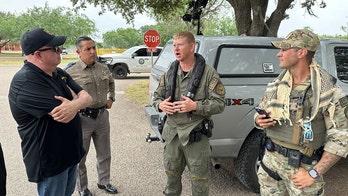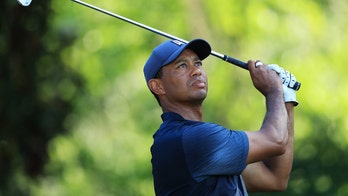Presidential Debate: Obama, Romney on Immigration
Immigration was one of many issues where the candidates aggressively attacked each other's records.
HEMPSTEAD, N.Y. – For the first time this election season, President Barack Obama and his Republican challenger Mitt Romney squared off on the hot-button issue of immigration.
Latinos across the country had hoped that an issue they cared deeply about – and had been largely ignored in previous face-offs – would finally be brought up during the second presidential debate.
And for 10 minutes, 14 seconds, the two blamed each other for a broken immigration system. Romney said Obama failed the past four years to approve an immigration reform system and Obama blamed Romney for the anti-immigrant rhetoric that is making its way across the country.
"Now when the president ran for office, he said that he'd put in place, in his first year, a piece of legislation -- he'd file a bill in his first year that would reform our -- our immigration system, protect legal immigration, stop illegal immigration. He didn't do it," Romney said during the town hall style debate at Hofstra University. "He had a Democrat House, a Democrat Senate, super majority in both Houses. Why did he fail to even promote legislation that would have provided an answer for those that want to come legally and for those that are here illegally today?
Obama sharply attacked Romney’s past comments on immigration– including saying that part of Arizona’s controversial SB 1070 law was a “model for the nation” -- and questioned appointing the architect of that law, Kris Kobach, as the presidential candidate’s immigration advisor.
"...It's very hard for Republican's in Congress to support comprehensive immigration reform," Obama said. "If their standard-bearer has said that, 'This is not something I'm interested in supporting.'"
Romney said he would give green cards to people who graduate with need skills, but he stressed that illegal immigration needed to stop.
“There are 4 million people who are waiting in line to get here legally. Those who've come here illegally take their place,” Romney said. “So I will not grant amnesty to those who have come here illegally.”
He also said he would support a pathway to permanent residency for undocumented children.
Obama said he wanted to streamline the legal immigration system by reducing the backlog and making it easier, simpler and cheaper for people so they could "contribute to our country and that's good for our economic growth."
Aside from immigration, an aggressive Obama ripped into Romney's economic proposals, accusing his rival of favoring a "one-point plan" to help the rich at the expense of the middle class. The Republican protested the charge was way off the mark.
"The middle class has been crushed over the last four years," Romney said in the opening moments of the 90-minute debate, the second of three between the two men.
Obama strode onto the debate stage seeking a stronger showing than the listless performance in their initial encounter, which had sent shudders through his partisan supporters and helped fuel a rise in opinion polls by Romney.
The president was feistier from the outset, quickly challenging Romney on economics and energy policy, and accusing him of switching positions on coal production.
The two men interrupted one another early and often, speaking over each other to the point that neither could be understood.
"You'll get your chance in a moment. I'm still speaking," the former Massachusetts governor tried to cut off Obama at one point.
One heated exchange early in the debate focused on competing claims about whether energy production is increasing or slowing. Obama accused Romney of misrepresenting what has happened — a theme he made time and again. Romney strode across the stage to confront Obama face to face, just feet from the audience. The two argued forcefully at close quarters before the debate moved on.
Both men used the opening moments of the encounter to pledge a better economic future to a young man who asked the first question, a member of a pre-selected audience of 82 uncommitted voters.
But the president's determination to show a more aggressive side quickly showed.
Rebutting his rival's claim to a five-point plan to create 12 million jobs, Obama said, "Gov. Romney says he's got a five-point plan. Gov. Romney doesn't have a five-point plan. He has a one-point plan. And that plan is to make sure that folks at the top play by a different set of rules."
"That's been his philosophy in the private sector," Obama said of his rival. "That's been his philosophy as governor. That's been his philosophy as a presidential candidate. You can make a lot of money and pay lower tax rates than somebody who makes a lot less."
"You can ship jobs overseas and get tax breaks for it. You can invest in a country, bankrupt it, lay off the workers, strip away their pensions and you still make money. That's exactly the philosophy that we've seen in place for the last decade," the president said in a scorching summation.
Unable to respond at length because of the debate's rules, Romney said the accusations were "way off the mark."
Both men had rehearsed extensively for the encounter, a turnabout for Obama.
"I had a bad night," the president conceded, days after he and Romney shared a stage for the first time, in Denver. His aides made it known he didn't intend to be as deferential to his challenger this time, and the presidential party decamped for a resort in Williamsburg, Va., for rehearsals that consumed the better part of three days.
Romney rehearsed in Massachusetts and again after arriving on Long Island on debate day, with less to make up for.
"The first debate was huge and we've seen our numbers move all across the country," his wife, Ann, said before joining her husband in New York.
In a campaign filled with controversy, even the evening's ground rules sparked one.
Candy Crowley of CNN, the moderator, said she expected to be following up at times on questions from the audience. A formal memorandum drafted by the two campaigns said her role would be more limited, but she and the evening's sponsor, the Commission on Presidential Debates said they weren't party to it.
The questions were from about undecided voters inside the hall in a deeply Democratic state. But the audience that mattered most watched on television and was counted in the tens of millions. Crucially important: viewers in the nine battlegrounds where the race is likely to be settled.
The final debate, next Monday in Florida, will be devoted to foreign policy.
Opinion polls made the race a close one, with Obama leading in some national surveys and Romney in others. Despite the Republican's clear gains in surveys in recent days, the president led in several polls of Wisconsin and Ohio, two key Midwestern battlegrounds where Romney and running mate Paul Ryan are campaigning heavily.
Barring a last-minute shift in the campaign, Obama is on course to win states and the District of Columbia that account for 237 of the 270 electoral votes needed for victory. The same is true for Romney in states with 191 electoral votes.
The remaining 110 electoral votes are divided among the hotly contested battleground states of Florida (29), North Carolina (15), Virginia (13) New Hampshire (4), Iowa (6), Colorado (9), Nevada (6), Ohio (18) and Wisconsin (10).
Obama has campaigned in the past several days by accusing Romney of running away from some of the conservative positions he took for tax cuts and against abortion earlier in the year when he was trying to win the Republican nomination.
"Maybe you're wondering what to believe about Mitt Romney," says one ad, designed to remind voters of the Republican's strong opposition to abortion except in cases of rape, incest or when the life of the mother is at stake.
Romney countered by stressing both in person and through his television advertising the slow pace of the economic recovery, which has left growth sluggish and unemployment high throughout Obama's term. Joblessness recently declined to 7.8 percent, dropping below 8 percent for the first time since the president took office.
Romney also has stepped up his criticism of the administration's handling of the terrorist attack against the U.S. Consulate in Benghazi, Libya, more than a month ago that resulted in the death of U.S. Ambassador Chris Stevens and three other Americans.
So far, the Republican challenger has not aired any television advertising on the issue, a suggestion that strategists believe it dims in importance next to the economy.
But the attack sparked one of the sharpest exchanges in last week's vice presidential debate, when Ryan cited it in asserting that the administration's foreign policy was unraveling and Vice President Joe Biden accused his rival of uttering "a bunch of malarkey."
Biden also said that "we" had not been aware of a request for additional security at the facility, a statement that the White House later said applied to the president and vice president.
Secretary of State Hillary Rodham Clinton said Tuesday she accepted responsibility for the level of security assigned to the consulate.
With reporting from The Associated Press.
Follow us on twitter.com/foxnewslatino
Like us at facebook.com/foxnewslatino





